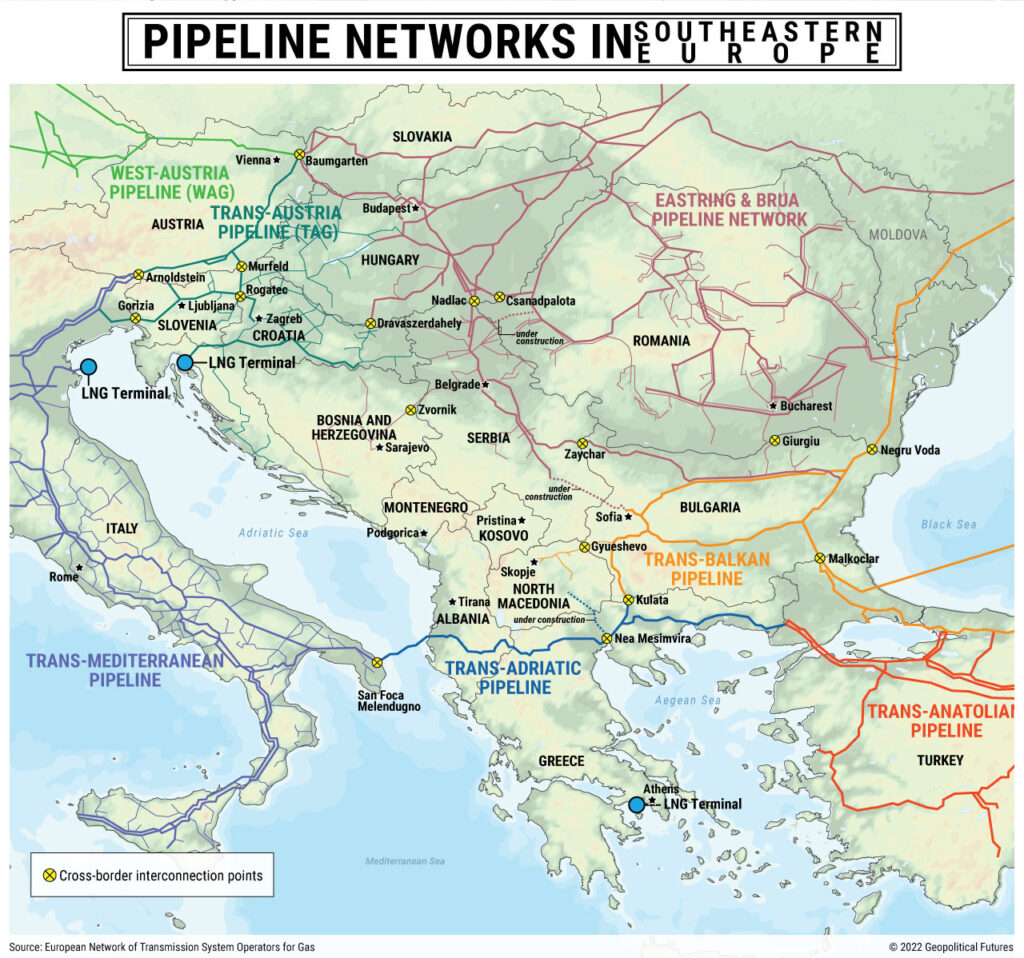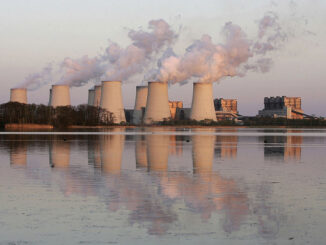
ENB Pub Note: This is one of the Energy News Beat series’s most important articles. I interviewed George McMillan on a 2-hour podcast interview. He is the CEO of McMillan Associates, a geopolitical and analytical energy company with extensive global studies and expertise. He is the CEO of McMillan Associates, a geopolitical and analytical energy company with extensive global studies and expertise. The podcast “ENB #160 What is the United States afraid of? George McMillan, CEO of McMillian Associates, stopped by the Energy News Beat podcast. – UPDATE” seemed like 5 min. It has answered so many “Energy Threads” that it is mind-blowing. Enjoy this first article from George:
Russian Natural Gas and Geopolitical Realignment—a reverse domino theory
George McMillan, November 27, 2023
With the Cold War in the rearview mirror for over three decades, it turns out that cheap Russian natural gas delivered by pipeline is the biggest threat to the United States’ superpower status.

Natural gas delivered by pipeline is significantly cheaper than any other form of energy, and any industrial power center with natural gas pipelines to Russia will have significantly lower energy costs, boosting the price competitiveness of their machine tool, heavy equipment, automobiles, advanced electronics, consumer products, and agricultural fertilizer products in the global markets.
Those not connected will be less competitive industrially and will experience higher levels of inflation associated with declining living standards.
The Russian Federation has an abundance of clean and inexpensive natural gas ranging from the Caspian Sea region, to the Urals mountains, along the entire Arctic Ocean range, and to the Far East, including Sakhalin Island just 30 miles North of Japan’s Island of Hokkaido. Russia can supply all United States’ allies with natural gas by pipeline much more cheaply than the US can with liquified natural gas (LNG).
The domino theory, originally applied to Marxist communism, is more appropriate for natural gas shipped by pipeline.
Warhawks
The United States and United Kingdom war hawks since the Reagan and Thatcher administrations have been worried about Russia’s ability to deliver cheap natural gas via pipeline to Germany in Western Europe, China, Japan via Sakhalin Island, and even to the entire Korean peninsula via Vladivostok.
The fear is that once one industrial power center Western ally connects to cheap Russian natural gas, then it becomes a race for the other coastal industrial power centers to gain the same competitive advantage in the global markets.
The US and UK counter strategy has been based on preventing a) natural gas from reaching an end user among the Western European or the Pacific Rim allies and b) the end user from paying Russia directly in Rubles, thus undermining the petrodollar financial system that supports the United States’ burgeoning $34 trillion of debt. It does not matter where or how a natural gas pipeline is sabotaged, inside Russia or outside Russia, the motive is always to prevent “a” then “b.” This makes the understanding of the conflict zones all along Eurasia easier to understand—they are not random.
The hypothesis from Halford Mackinder, the father of geopolitical theory at Oxford University at the turn of the 20th Century, was that the more Russia can deliver its abundance of raw materials from the “Eurasian heartland” to the Eurasian “coastal rimland” industrial power centers, the more Russia will become the global political center of gravity. This hypothesis has only become truer with the advancement of railways and pipelines that speed low-cost overland delivery.
Diplomatic, Infrastructure, Military and Economic (DIME) Alliances
The economic diplomatic concern is that since (1) Russia and China have been infrastructurally integrating with the completion and expansion of Power of Siberia 1, with Power of Siberia 2 in the works; (2) Russia and Germany are becoming increasingly infrastructurally integrated with Nordstream 1 and 2; and (3) if Japan were allowed to complete the Sakhalin to Hokkaido railway tunnel and pipeline project, then South Kora would be sure to follow with a Korean Peninsula pipeline to keep its automobile and consumer products industries competitive globally.
Following suit, India may not be able to connect to Russia via pipeline directly as Turkmenistan, Afghanistan, Pakistan, and India pipeline has been stalled for decades due to the ongoing religious and ethnic rivalries in the region, but the Modi government nevertheless wants to complete the International North-South Trade Corridor (INSTC) project culminating at Chabahar, Iran. The three-fold goal here is: (1) to gain an overland route that is as direct as possible to receive Russian and Iranian oil and liquified natural gas (LNG), (2) avoid rival Chinese and Pakistani territory, and minimize the distance and time that cargo and tanker ships are on the ocean.
In geopolitical petroleum circles, many believe that the concern of cheap Russian natural gas associated with the loss of its allies is the motive behind the US sabotaging the Ural pipeline in 1982, politically sabotaging the notional Black Sea Southstream pipeline from Novorossiysk to Burgas in 2014, and steadfastly opposing Gerhard Schroder’s approval of Nordstream 1 and 2 going under the Baltic Sea that avoided US/UK/NATO controlled Poland, Ukraine, and Georgia.
The idea is that once one ally gains that economic and living standard advantage, then the other allies would be incentivized to follow and the US and UK would become isolated.
Ambassador George Kennan’s five industrial power center [strategy] of the US being allied with Germany in Western Europe and Japan in the Pacific Rim [was] in order to isolate the Soviet Union and China.
It is this Five Power Center strategy (six, with the inclusion of India) of the US and UK that would have been eclipsed had the series of pipeline projects between Russia and Germany, India, China, South Korea and Japan been permitted to continue. The Russian invasion of Ukraine led to the US sanctions on Russia that stopped all of the projects—just in the nick of time.
Part 2: Releasing tomorrow. Please reach out to George on his LinkedIn: https://www.linkedin.com/in/george-mcmillan-5665b015/



